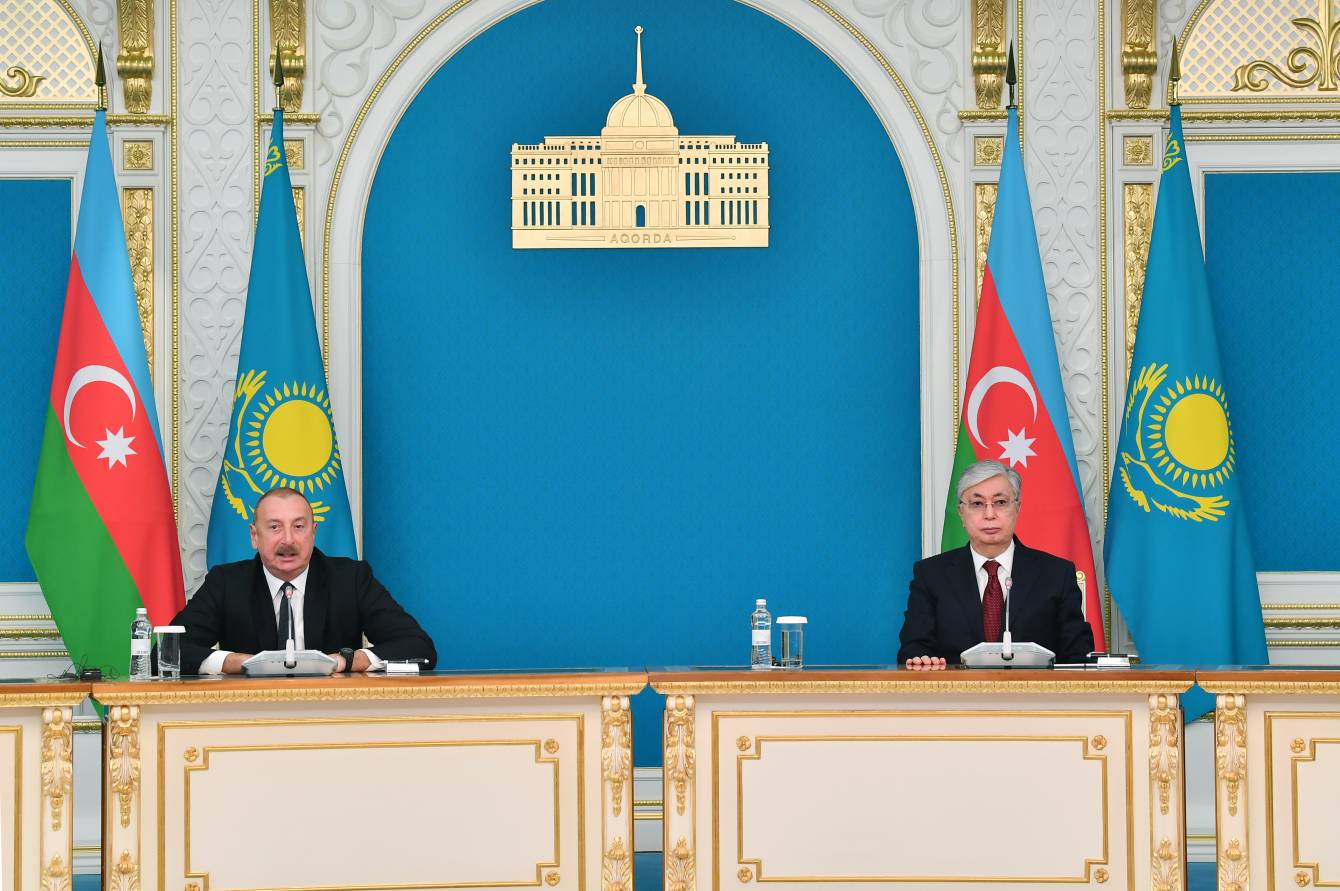Azerbaijan and Kazakhstan have agreed to leverage the full capacity of the Trans-Caspian International Transport Route, also known as the Middle Corridor, which stretches from China to Europe covering Central Asia and South Caucasus.
The agreement came during Azerbaijan President Ilham Aliyev’s visit to Kazakhstan on Monday.
In a joint press briefing in Astana, Kazakhstan’s President Kassym-Jomart Tokayev said it was important to fully utilize the capacity of the Middle Corridor with Azerbaijan, which is the Central Asian country’s Caspian Sea littoral neighbor.
“The full deployment of the potential of the Trans-Caspian International Transport Route, the so-called Middle Corridor, is of particular importance. We are talking about the improvement of logistical services, the creation of unified transport operators, the modernization of technical and tariff conditions, the elimination of administrative barriers and the emergence of a closed logistical cycle,” Tokayev said, during the briefing published on President.Az.
He added that the effective implementation of the roadmap for the development of the Middle Corridor for 2022-2027 is also of great importance, hence, Baku and Astana agreed to take full advantage of the growing interest in this route and involve third countries in its infrastructure development.
The roadmap for 2022-2027 provides for the simultaneous removal of bottlenecks and the development of the Middle Corridor over the five-year period by all participating states. The document envisages agreed principles of work, as well as specific projects with precise parameters, implementation deadlines and responsible executors. It will be possible to increase the throughput capacity along the corridor up to 10 million tons per year by 2025 after the implementation of the agreements.
In August 2022, Presidents Aliyev and Tokayev agreed to leverage the full potential of the Middle Corridor for contributing to the growth in bilateral trade turnover, which currently stands at $598 million after a four-fold increase since 2022.
In June, the foreign ministers of Azerbaijan, Kazakhstan and Türkiye agreed in Baku to reinforce cooperation efforts between the three countries and strengthen regional connectivity through already available and new agreements. They agreed to capitalize on the potential of the Middle Corridor.
President Aliyev, for his part, said the decisions made in Baku in August of last year were already being implemented, including joint efforts on connecting the transport and logistical infrastructure of the countries in order to fully utilize the opportunities of the Middle Corridor.
“Today, we discussed specific figures and a schedule for increasing cargo transportation along the East-West route. We gave tasks to the heads of relevant agencies to study all these issues in the near future,” the Azerbaijani president said, referring to meetings in limited and expanded formats with Kazakh officials.
The Baku International Sea Trade Port (Azerbaijan), Aktau/Kuryk ports (Kazakhstan) and Turkmenbashi Port (Turkmenistan) are the main maritime points of the Middle Corridor, which promises even bigger benefits to the landlocked countries in the region.
In one year, out of approximately 10 million containers that are transported from China to Europe, 96 percent utilize sea routes and only the remaining 4 percent uses the Trans-Siberian Railway, which is also called the Northern Corridor.
The Middle Corridor is economical and faster compared to the Northern Corridor as a trade route between Europe and Asia and shrinks the travel distance by 2,000 kilometers.
The Middle Corridor also runs through more favorable climate conditions and shortens the travel time by 15 days compared to the sea route. Furthermore, the Middle Corridor offers great opportunities for cargo traffic in Asia so that the loads can reach the Middle East, North Africa and the Mediterranean region by integrating the port connections in Türkiye.
If used effectively, the Middle Corridor is expected to create important economic opportunities, enabling South Caucasian and Central Asian countries to benefit from China-Europe trade, which is valued at $600 billion annually. In particular, the establishment of logistical centers and free trade zones at the ports of Azerbaijan, Kazakhstan and Turkmenistan will facilitate the development and deepening of Trans-Caspian cooperation.







 The number of evacuees from flooded areas in Kazakhstan has reached 97,852 people, including about 32,856 children since March 27.
The number of evacuees from flooded areas in Kazakhstan has reached 97,852 people, including about 32,856 children since March 27.
 The Islamic holy month of fasting, Ramadan comes to an end this week with the celebration of a joyous festival called Eid (meaning “festival” in Ar...
The Islamic holy month of fasting, Ramadan comes to an end this week with the celebration of a joyous festival called Eid (meaning “festival” in Ar...
 Iran's senior military leaders described the drone and missile attack on Israel on April 14 night as “successful".
Iran's senior military leaders described the drone and missile attack on Israel on April 14 night as “successful".
 Iranian President Ebrahim Raisi warned Israel that it would face a "real and extensive" response if it makes any "mistake" following Tehran’s missi...
Iranian President Ebrahim Raisi warned Israel that it would face a "real and extensive" response if it makes any "mistake" following Tehran’s missi...



